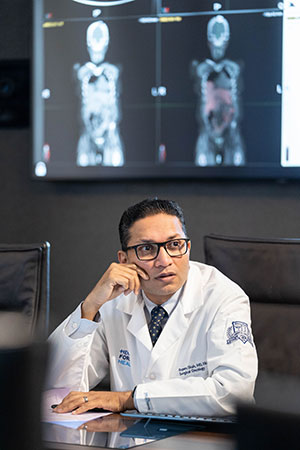Pancreatic Cancer Surgery
Pancreatic cancer surgery, including the Whipple procedure or partial pancreatectomy, may offer the best chances for healing. But the cancer’s severity and location can make surgery difficult or possibly dangerous.
At Henry Ford Cancer, you are in the hands of nationally recognized cancer surgery experts (surgical oncologists). We take steps to ensure a safe procedure and deliver precise care that yields outstanding results.
Newly diagnosed?
About pancreatic cancer surgery
 Your pancreas lies deep in the abdominal cavity near other organs, like your small intestine and liver. Its location next to critical blood vessels makes it challenging to perform a successful operation. This is because the blood vessels can cause severe complications if disturbed.
Your pancreas lies deep in the abdominal cavity near other organs, like your small intestine and liver. Its location next to critical blood vessels makes it challenging to perform a successful operation. This is because the blood vessels can cause severe complications if disturbed.
If you are considering surgery, the best care comes from programs that see a high volume of patients with pancreatic cancer. Henry Ford is among the highest volume pancreatic cancer programs in Michigan. We are also nationally recognized as a high-volume center.
Our experience from regularly performing the Whipple procedure and partial pancreatectomy helps more patients have successful outcomes. Pancreatic cancer surgery complication rates are lower than the national average, making it easier to move forward with your life after surgery.
Pancreatic cancer surgery at Henry Ford: Why choose us?
You receive care from doctors who specialize in cancer surgery (surgical oncologists). Our experts completed additional training through fellowships and specialize in gastrointestinal cancers, such as pancreatic cancer. This level of expertise is not widely available in Michigan and helps you receive exceptional care.
Highlights of our program include:
- Team approach: A team of approximately 30 specialists gathers in meetings called tumor boards to coordinate your care. Surgeons work alongside medical oncologists, radiation oncologists and other experts.
- Careful treatment planning: We take time to determine whether surgery is right for you and how to plan the safest possible procedure. After reviewing tests and imaging studies, we may recommend other treatments to shrink the tumor before surgery. Your care may include chemotherapy, radiation therapy or a combination of both.
- Minimally invasive techniques: We often perform pancreatic cancer surgery using minimally invasive techniques. We access the pancreas through the smallest necessary incision. Sophisticated surgical instruments and technologies enable us to carry out the procedure with less disruption to nearby tissue.
- Clinical trials: Henry Ford is advancing pancreatic cancer care and outcomes through research. You may be eligible to take part in these efforts through clinical trials. Participating means you may be among the first people in the nation to receive innovative new therapies. Explore pancreatic cancer clinical trials and research.
Surgery for pancreatic cancer
Henry Ford offers the full range of pancreatic cancer surgeries. We discuss which option is best for you and explain the risks and benefits. We also provide you with information about what to expect during recovery and after getting home from the hospital. Our comprehensive approach takes some of the worry out of having surgery and lowers your risk of complications.
Curative surgery
If the tumor has not spread, you may be eligible for curative-intent surgery. This type of procedure does not guarantee a cure, but it does give you greater chances of becoming cancer-free.
Your care may include:
- Whipple surgery (pancreaticoduodenectomy) is for cancer near the head of the pancreas. This is the widest part of the pancreas near the stomach and small intestine. A Whipple procedure involves removing the tumor, along with a portion of the stomach, small intestine and bile duct.
- Partial pancreatectomy is an option for cancer at the opposite end of the pancreas, near its neck, body or tail. This type of surgery involves removing the affected part of the pancreas.
- NanoKnife®: In select patients who are not eligible for traditional surgery, NanoKnife may be an option. This procedure uses technology to deliver electrical pulses that destroy cancer cells while avoiding damage to nearby healthy tissue. Henry Ford was the first program in Michigan to offer this option.
Palliative surgery
Palliative procedures relieve discomfort, including ongoing pain or regular vomiting, due to complications of pancreatic cancer. This type of surgery is for people who may be too sick to tolerate traditional surgery. Or tumors may be too close to sensitive blood vessels for a safe procedure. Surgery may include inserting a mesh device (stent) to relieve intestinal blockages.
Supportive care
Pain, weight loss and other symptoms are common in pancreatic cancer, even after successful surgery. We offer supportive therapies to minimize the chances of these issues hampering your recovery. You may receive personalized nutrition support or pain management therapies from palliative care doctors. Learn more about supportive care for pancreatic cancer.
.svg?iar=0&hash=F6049510E33E4E6D8196C26CCC0A64A4)

/hfh-logo-main--white.svg?iar=0&hash=ED491CBFADFB7670FAE94559C98D7798)